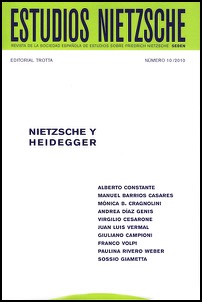Modern Age is burning: Nietzsche and Heidegger.
DOI:
https://doi.org/10.24310/EstudiosNIETen.vi10.10180Keywords:
Nietzsche, Heidegger, metaphysics, earth ominion, the other beginningAbstract
The controversy of Heidegger with Nietzsche has a close goal and a distant one: the close goal is the exhibition of the internal unity of the fundamental Metaphysical position of Nietzsche, according to the position of attention of our time; the distant goal is the unfolding of the question if the supreme struggle is then the Metaphysical fight for earth dominion or if what happens in history can find another beginning that is not already Metaphysical. Nevertheless, the decisive point continues to be hearing Nietzsche, to ask with him, by him and through him, and that means: to ask at the same time against him, but in favour of the unique cause, the common and more intimate cause of western philosophy.
Downloads
Metrics
References
Barthes, R., Lo obvio y lo obtuso. Imágenes, gestos, voces, Buenos Aires: Paidós, 1986.
Blanchot, M., El diálogo inconcluso, especialmente, «Nietzsche y la escritura fragmentaria», Caracas: Monte Ávila Editores, 1970.
De Waelhens, A., La filosofía de Martin Heidegger, Universidad Autónoma de Puebla, 21986.
Foucault, M., Las palabras y las cosas. Una arqueología de las ciencias humanas, México: Siglo XXI, 1997.
Grave, C., Nietzsche y Heidegger, ¿El último metafísico y el nuevo inicio del pensar?, México: UNAM, 2002.
Heidegger, M. , Conferencias y Artículos, Barcelona, Ediciones del Serbal, 1994.
Heidegger, M. Nietzsche, 2 vols., traducción de Juan Luis Vernal, Barcelona: Destino, 2000.
Heidegger, M., «La frase de Nietzsche «Dios ha muerto»», en Caminos de bosque, trad. de Helena Cortés y Arturo
Leyte, Madrid: Alianza, 1996.
Heidegger, M., «De la esencia de la verdad», en Hitos, ed. de Helena Cortés y Arturo Leyte, Madrid: Alianza, 2000.
Heidegger, M., Über den Humanismus, Frankfurt am Main: V. Klostermann, 21959.
Heidegger, M., Zollikoner Seminare, ed. de M. Boss, Fránkfort a. M.: Klostermann, 1987.
Laiseca, L., El Nihilismo europeo, el nihilismo de la moral y la tragedia anticristiana en Nietzsche, Buenos Aires: Biblos, 2001.
Nietzsche, F., Obras Completas, I-IV (OC ). Director ed. Diego Sánchez Meca. Madrid: Tecnos, 2011-2016
Nietzsche, F., Correspondencia I-VI. (CO). Director ed. Luis E. de Santiago Guervós. Madrid : Trotta, 2005- 2012.
Nietzsche, F., Fragmentos Póstumos I-IV (FP). Director ed. Diego Sánchez Meca. Madrid: Tecnos, 2006-2010.
Nietzsche, F., Inventario, ed. de Fernando Savater, Madrid: Taurus.
P. Rivero Weber, P., «Las notas de la verdad en la hermenéutica nietzscheana», en Cuestiones hermenéuticas, de Nietzsche a Gadamer, México: UNAM, 2006.
Sloterdijk, P., Der Denken auf der Bühne. Nietzsches Materialismus, Frankfurt am Main: Suhrkamp, 1986.
V. Gerhard, V., Friedrich Nietzsche, München: Beck, 21995.
Vattimo, G., El fin de la modernidad, Barcelona: Gedisa, 1994.
Vattimo, G., El pensamiento débil, trd. Luis E. de Santiago, Madrid: Cátedra, 1990. M. Cragnolini, M. B., Moradas Nietzscheanas. Del sí mismo, del otro y del «entre», Buenos Aires: La Cebra, 2006.
Vattimo, G., Introducción a Nietzsche, Barcelona: Gedisa, 1987
Xolocotzi, Ángel, Fenomenología de la vida fáctica, Heidegger y su camino a Ser y tiempo, México: Universidad Iberoamericana y Plaza y Valdés, 2004.
Downloads
Published
How to Cite
Issue
Section
License
As of issue 21 (2021) this journal is published only in open access (diamond route).
From that number 21, like the previous numbers published in NIETZSCHE STUDIES, they are subject to the Creative Commons Acknowledgment-NoComercia-ShareIgual 4.0 license, the full text of which can be consulted at <http://creativecommons.org/licenses/by-nc-sa/4.0 >
It is the responsibility of the authors to obtain the necessary permissions of the images that are subject to copyright.
This work is licensed under a Creative Commons Attribution-NonCommercial-ShareAlike 4.0 International License.
Copyright generates two different rights: moral rights and patrimonial rights that EJFB recognizes and respects. Moral rights are those relating to the recognition of the authorship. They are rights of a personal nature that are perpetual, inalienable, unseizable and imprescriptible as consequence of the indivisible union of the author and his/her work.
Patrimonial rights are those that can be derived from the reproduction, distribution, adaptation or communication of the work, among others.







11.png)
